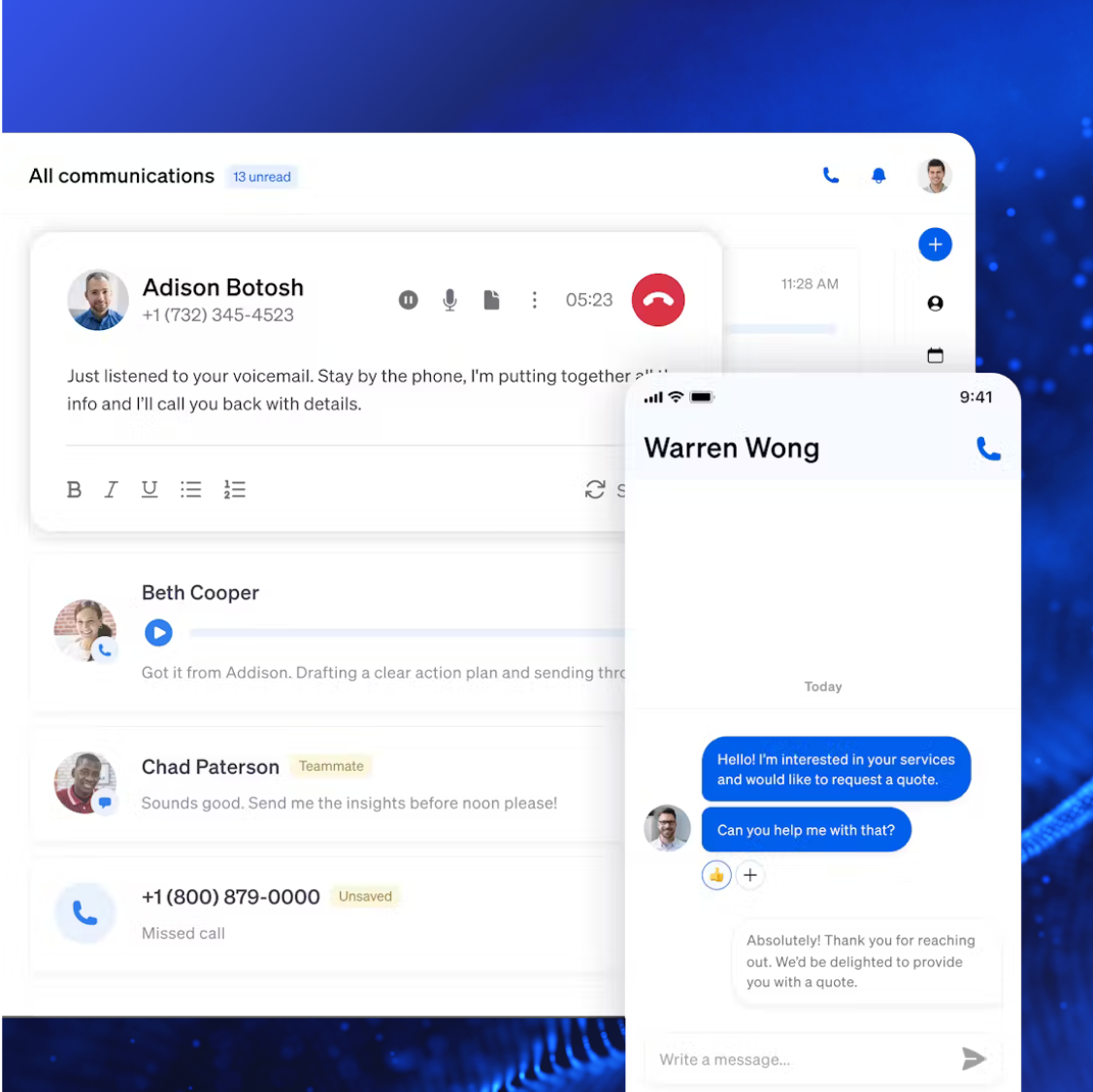| What Is Customer Experience Analytics? Customer experience (CX) analytics is the recording and interpreting of data from customer interactions and feedback. These analytics help businesses draw insights on enhancing the overall customer experience. |
Delivering a positive experience is a key customer service goal for most businesses. Measuring the impact of your efforts to improve can be difficult without a centralized view of customer data. That’s where customer experience analytics come in.
Customer experience analytics measures and interprets customer data across all touchpoints. Businesses should measure these analytics to track the customer journey to keep a finger on the pulse of their CX, then apply that knowledge toward improving it.
Below, we’ll touch on the key reasons why data is so important to deliver a top-notch CX and manage a squeaky-clean reputation with customers. We’ll also break down metrics you need to know and how to maximize your ROI for improving CX.
Get ready for a deep dive into customer experience analytics, data, and metrics.
Importance of Data in Customer Experience
Data is the foundation for understanding customer behavior.
You can discover customer insights into habits, preferences, and pain points by analyzing metrics like purchasing history, demographic information, website sessions, and feedback. This, in turn, helps you tailor your products, services, and marketing efforts to ultimately drive growth and profitability.
Here are the main benefits that intelligent CX measurements offer to businesses.
Retain more customers over time
Data helps you improve customer retention, increase customer lifetime value (CLV), and lower churn by opening up actionable customer experience insights into the factors that influence customer satisfaction (CSAT) and loyalty, like:
- Product quality
- Customer service
- Ease of doing business
- Personalization
- Brand reputation
- Price and value proposition
As customer-use data and feedback roll in, you can begin to spot pain points along your customer journey map.

One of the most important ways customer experience analytics helps retain customers is by using historical data to identify patterns that help predict customer behavior. This is called predictive analytics.
One way you might use predictive analytics in a call center, for example, is to match your agents’ schedules to when you expect higher call volumes.

Personalize the customer experience
Personalization can help lower retention, but that’s not all. Businesses that view personalization as an organization-wide directive rather than a marketing responsibility can better position themselves to cater to all their customer needs.
Personalize the customer experience more easily with data that helps you:
- Segment customers into groups (based on info like purchasing history or preferences) to improve target marketing.
- Track behaviors through interactions with websites, social media apps, and other customer touchpoints, especially if integrated with an omnichannel contact center environment.
- Adjust content dynamically to personalize customer interactions in real time, like making suggestions based on products viewed.
The simple truth is that customers expect personalization, too — according to research from McKinsey , over 70% of customers view personalized services as a given. Businesses that don’t meet basic customer expectations might expect to lose customer support quickly.
Improve agent effectiveness
With customer experience analytics, agents have more access to customer information. This makes it easier for agents to offer personalized and efficient assistance while addressing customer tickets more effectively.
Data-driven customer experience tools can also provide agents with real-time guidance based on predefined workflows. These analytics tools assist agents in making informed decisions, resolving issues quickly, and delivering consistent service across interactions.
CX data can also fuel automation tools that streamline repetitive tasks and workflows, freeing agents to focus on more complex or meaningful interactions. Less time spent on tedious activities means a more efficient customer service team.
A complete call center solution.
See why top brands use Nextiva to handle calls at scale. Easy to use. Fast setup.
Top Customer Experience KPIs & Metrics
Measuring CX analytics without the right KPIs and customer service metrics is like baking a cake with ground beef — you can’t achieve the desired finished product without the right ingredients.
These are the most important KPIs to help you measure customer experience:
| Customer Experience Metric | Purpose |
|---|---|
| Average Wait Time | How long customers remain on hold before connecting with a support agent |
| Rate of Answered Calls | How many calls your agents can answer |
| First Contact Resolution Rate | How many customer tickets get resolved the first time they contact you |
| Call Service-Level Agreement | How many calls agents answer within a period |
| Average Handle Time | The amount of time customers spend on calls from start to finish |
| Average Interactions Per Ticket | How many times a customer contacts support over the same issue |
| First Response Time | How quickly agents respond to customer inquiries |
| Average Response Time | How quickly agents follow up on customer messages |
| Average Resolution Time | How quickly agents resolve customer issues |
| Issue Resolution Rate | How many issues get resolved as a percentage of all issues |
| Self-Service Usage | How many customers use your self-service resources |
| Backlog | How many unresolved tickets are left |
| Customer Satisfaction Score | How satisfied your customers feel, based on survey responses |
| Net Promoter Score | How likely your customers are to recommend you, based on survey responses |
| Customer Effort Score | How much effort you cost your customers, based on survey responses |
| Customer Churn | How many customers you lost during a period |
| Repurchase Rate | How many customers return |
How to Maximize ROI for CX Analytics
Your ROI on a CX analytics platform or strategy will most likely vary depending on how well you can analyze and interpret customer data and put a CX plan into action.
However, most businesses aren’t measuring customer experience in ways that support their own goals. Only 15% of business leaders surveyed by McKinsey were “fully satisfied” by their efforts to measure CX. Even more troubling, only 6% were confident their CX measurements benefited strategic and tactical decision-making.
If most brands aren’t measuring CX comprehensively, it’s also safe to assume they’re not maximizing their ROI on those efforts.
Use these tips to boost your CX analysis efforts and help increase your ROI.
Collect data from all customer channels
An omnichannel environment is a seamless experience where all customer channels are fully integrated. This allows continuous communication across those channels and reduces setbacks (like repeating relevant information), giving customers peace of mind that whoever they’re talking to is in the loop and ready to help them.
Here are some of the best tools to analyze and interpret customer data across multiple touchpoints:
| Customer Experience Tool | Pros | Cons |
|---|---|---|
| Nextiva | Data from all customer interactions informs CX insights | Scalable support; more friendly to medium-sized businesses |
| Hotjar | Customer heatmaps track website traffic | Limitations with troubleshooting and customer support |
| Qualtrics | A variety of survey types allows for unique feedback | Confusing user interface that slows down implementation |
| Gainsight | Customer engagement notes are easy to search | Engagement metrics like frequency are not trackable |
| UXPressia | Customer journey maps with segmentation are easy to interpret | Scaling and collaborating are inefficient without shareable views |
Your customers are already hopping between service channels when they look for support or try to solve a problem. In most cases, they’re switching between three to five different channels, and 86% of those customers expect those channel hops to be seamless. A customer experience dashboard can make that info easily accessible across all channels for intuitive, effortless customer service.
Set clear benchmarks for your CX goals
Positive customer experiences can drive profits higher — just ask the 91% of customers who are more likely to make a repeat purchase after a great experience. The more specific your customer experience goals, the easier they are to achieve.
Here’s how to set clear CX benchmarks for your business:
- Define your objectives, whether you want to improve customer satisfaction, lower churn, or something else.
- Select metrics that you’ll use to measure those objectives, like the top CX KPIs listed above.
- Set targets for those metrics based on historical data or competitor or industry averages.
- Monitor your progress regularly to notice any unexpected changes and to keep an eye on your efforts over time.
- Adjust your strategy based on any changes you notice while measuring progress; for example, add a follow-up survey for feedback if you notice fewer customers leaving reviews.
While your CX ROI might also vary based on outside factors like the economic climate or geopolitical issues, you can help boost your brand loyalty by focusing on the factors you can control.
Grasp the Entire Customer Journey Easily with More Complete Data
The customer journey has several opportunities to measure data and assess interactions. Contact centers that understand the correlation between analyzing CX, improving customer satisfaction, and increasing revenue can offer their customers a more personalized experience than those that don’t measure all their CX metrics.

Customer experience analytics uncover powerful tools to better understand the customer journey. By leveraging CX tech and tools for analytics, you can harness data from multiple touchpoints to better understand customer behavior. With this knowledge, you can be better prepared to spot trends, adjust, and improve your customer experience.
A complete call center solution.
See why top brands use Nextiva to handle calls at scale. Easy to use. Fast setup.
Net Promoter, Net Promoter Score, and NPS are registered trademarks of Satmetrix Systems, Inc., Bain & Company, Inc., and Fred Reichheld.
Related: Step-by-Step Customer Experience Research Framework
Customer Experience Analytics FAQs
For more information, check out these frequently asked questions about customer experience analytics.
Customer experience analytics can benefit any business that wants to measure and improve customer satisfaction, retention, and other loyalty metrics. That means that all businesses with paying customers should measure customer experience analytics.
Some of the top KPIs for customer experience analytics are:
* First contact resolution rate
* Average handle time
* Issue resolution rate
* Customer satisfaction score
* Net Promoter Score®
These customer service metrics measure different CX aspects for a complete view of the customer journey.
The ROI on customer experience analytics will vary depending on your industry, goals, and how widely you implement CX changes. Customer experience analytics can help you improve customer loyalty and retention, which can drive revenue. The best way to increase ROI on CX analytics is to manage your customer experience as a key part of operations across all teams, not just your customer service agents.
Companies across all industries are expected to invest more in CX management to realize a higher ROI from their efforts. Grandview Research predicts the CX management market to see a compound annual growth rate (CAGR) of more than 15% by 2030, topping out at more than $30 billion.















 Customer Experience
Customer Experience 










